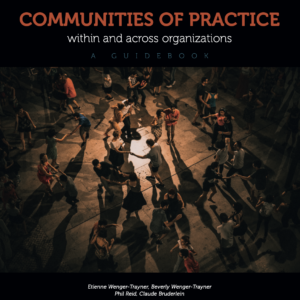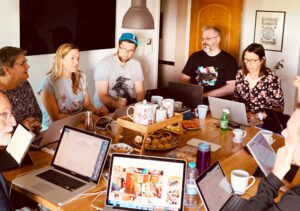NOTICE: This is an old blog post. There is an updated version of all these FAQs on our new website:
A community of practice is a group of people who share a concern or a passion for something they do, and learn how to do it better as they interact regularly. This definition reflects the fundamentally social nature of human learning. It is very broad. It applies to a street gang, whose members learn how to survive in a hostile world, as well as a group of engineers who learn how to design better devices or a group of civil servants who seek to improve service to citizens. In all cases, the key elements are:
The domain: members are brought together by a learning need they share (whether this shared learning need is explicit or not and whether learning is the motivation for their coming together or a by-product of it)
The community: their collective learning becomes a bond among them over time (experienced in various ways and thus not a source of homogeneity)
The practice: their interactions produce resources that affect their practice (whether they engage in actual practice together or separately)
For more information, click here:
For a more precise definition, see our theory page on communities of practice:
For a bit more info, see our general (but brief) introduction to communities of practice and their use in various contexts:
For practical advice on cultivating communities of practice, see our new guidebook:
For workshops on cultivating communities of practice:



Pingback: Introducing “learning citizenship” in Israel | Wenger-Trayner
Pingback: What is social learning? | Wenger-Trayner
Pingback: A Way In « The Theatre Hub Project
Pingback: Purple Elf's Learning Adventures » Blog Archive » Teacher Learning via Twitter Part 1
Pingback: Teacher Learning via Twitter part 1 | Pedagoo.org
Pingback: What I Learned in My Knowledge Management Class
Pingback: Community of practise and connectivism | burleysablog
Pingback: 9 Problems Keeping Your Online Community from Being Great | News Feed
Pingback: 8. Erste Schritte zu ungeahnten Möglichkeiten… | HR-Diskurs - Trends am Bildungsmarkt
Pingback: Learning in landscapes of practice | Wenger-Trayner
Pingback: Aim 1: A community of practice for community researchers and practitioners | Community Research and Action Network
Pingback: First Community of Practice Meeting | The Level Up
Pingback: First Community of Practice meeting | uocutjlt
Pingback: Community of Practice & Situative Learning | carolinemccluskey
Pingback: Adult Literacy Research Institute
Pingback: Stories from the Field 3: An exploration of programming through innovation in ESL Literacy | Adult Literacy Research Institute
Pingback: Building effective virtual communities | On The Same Page
Pingback: 15-16 Faculty Learning Community Grants | Assessment, Learning, Teaching
Pingback: Plan Your Professional Development for 15-16! | Assessment, Learning, Teaching
Pingback: Plan Your Professional Learning for FY 15-16! |
Pingback: Wenger_Worksheet_Hatton – Daily Blog Performances
Pingback: What is Community of Practice? – Little Smooth
Thank you for the information.. 🙂
Thanks for nice sharing and thougtful statements.
Pingback: Building effective virtual communities | On the Same Page
Pingback: Week 12: The Future and Revision | alh.meshari
Pingback: Week 25 – Reflection on practice – APC Reflective journal Roxanne English
Pingback: CoI for the Next Generation – Valerie VogelScheidt: EDTECH Learning Log
Pingback: My Wiki Page- Community of Practice – EDIS3610
Pingback: Digital pedagogikk – Arne Midtlund
Pingback: Defining my community of Practice | petesmindblog
Pingback: Building Effective Virtual Communities - On The Same Page
Pingback: 141 knowledge community Success Criteria – Help Desk | helpdesksurvival.com – Keep at it.
Pingback: Identity in practice (Wenger: Communities of Practice) | ZML Didaktik / Innovative Learning Scenarios
all three are best but practice is very important
Peer learning always works.Avoid criticising other performance. Sure share your ideas on Teaching strategies which will help your colleagues.
I agree with these comments that Peer review / observation should be constructive & confidential
Pingback: Vaping: A Way to Quit Smoking or a Cultural Phenomenon? - VaporVanity
Pingback: Applying to become a Senior Fellow of the Higher Education Academy | Remembering My Hat
Pingback: 10 Problems Keeping Your Online Community from Being Great – Social Fish
Pingback: EDUU 629- Week 4 – 21st Century Teacher
Pingback: How Developers and DBAs Collaborate in a DevOps World (video) - by Kendra Little
Pingback: Academia can help humans and large carnivores coexist
Pingback: Community of Practice | Fandi Suied
Pingback: Academia can help humans and large carnivores coexist – Quick News
Hi. What if there is a teacher in a practice. Like a driving instructor and a student. Will they form a community of practice? I mean, since the instructor might not learn from the student about driving. At least not the same type of learning. The instructor may learn about how to teach a student in such and such situation (if he is reflexive about his style of teaching).
Same with a dentist, doctor, nurse guiding students in practice. Since there is a power relation here, can these be in a CoP in relation with eachother?
I will highly appreciate any response.
Kind regards S
Hi Solveig
It’s a good question. Thinking of who is in and who is not, how the power relations between them might add or detract from developing the learning capability of the community – these are all questions we should ask when cultivating a community.
I can imagine it would work to have those two types of people in a community if they share the same practice. Let’s take a hypothetical example – say the idea was to try out a new type of car (maybe a self-driving one)… and the instructor and student both cared about what it meant to be drivers of a self-driving car from different perspectives. So then they would listen to each other’s perspectives because it could help them to understand the practice better. Together they could negotiate what it means to drive self-driving cars better than if each one did it alone. Then they could be a community of practice.
A less hypothetical example (it’s one we’ve seen). What if a writing teacher worked with her students to help them become self-critical of their writing and to think of their writing through the eyes of the reader. And what if she brought her writing to the classes because she wanted to know how to write better for readers like her students. And she showed them how to critique their own, each other’s, and her writing. That might be more like a community of practice.
So the short answer is no. A community of practice is made up of people who share a practice. The practice of a dentist or a doctor is not the same as the practice of a student, so they would make unlikely bedfellows in a community of practice. And if someone with power in the room makes it more difficult for others to talk about their practice, then you certainly wouldn’t want them there.
Dear Beverly
Thank you so much for your answer. This was very interesting, however still not perfectly clear. I hope you can help me a little bit more to understand. I am a PhD student and have interviewed medical students about their experiences in clinical placement.
Because: If I understand it right. In a clinical placement, a doctor (supervisor) and a medical student cannot form a community of practice? This because they have different roles. The doctor is supervising and the student is a learner.
I have been thinking this: The student is to learn how to do the skills of a doctor and develop the identity and role of a doctor. So the medical student is “acting” like a doctor doing assessments, documenting in the chart and so on. The student is kind of doing the work while the doctor is watching from the side, supervising and checking when needed. Together they learn about the patients and work for the patients benefit. I was thinking this was sharing the same practice and therefore forming a CoP.
But based on your answer, only if they were to learn something new together, then they would form a community of practice?
So the doctors share a community of practice, and the students share a community of practice. But they are not in one together?
This kind of rocked my world of understanding what a Community of Practice is and is not. I guess I have misunderstood what a “shared practice is”.
I would very highly appreciate some more of your time. Based on my above explanation, do I understand this correct now?
Kind regards Solveig
Hi Solveig
Maybe the first question to ask yourself is “is it useful to view them as a community of practice?” rather than “are they are a community of practice?”
If you look at them as a community of practice, you would start asking questions like: what is the practice they share? how are they negotiating what good patient care looks like here? how could an intervention maximize the learning learning capability of doctors and nurses in improving this practice? how does the power of the doctor get in the way of developing the learning capability? how does it enable? how does the experience and insight of the medical student contribute to the learning capability of them both?
If you find yourself asking – what is the medical student learning from the doctor, then you may want a different learning theory.
What about asking what medical students are learning from each other?
I’m a graduate student in Ohio and my MATESOL thesis includes CoP. My advisor was looking for a clearer definition of Domain for my Lit review. What it is, who is in it etc. My using CoP is from the sociolinguistics world, looking to identify how certain groups live and die by a certain person’s tweets.
Any chance of receiving a little more clarity for those of us this is new to? Please and Thank you!
Not sure what information you need. The domain refers to the area of focus that brings members together. This includes the difference they are trying to make, the kinds of challenges and questions they have, theories that underly their practice, and the recognized importance of this practice in the world.
Hi Bev and Solveig,
it starts with the determination of objectives. In the traditional way: The trainer presents the learning objectives according to the established program. The professional logic of the subject gives the necessary order of learning. The trainer answer questions. Teaching is dominant, learning is limited, trying to transmit ideas. There will be no CoP.
Changing from the traditional passive learning (which is very limited) to the future active role of learning
The topics are presented and the learning objectives are developed, negotiated, and agreed upon together with the trainees. Learning will be focusing the teacher will integrate into the learning community.
Even more, if he or she continues to facilitate active Learning: Trainees design the tasks and their sequences for a “step-by-step” appropriation of knowledge, skills, and problem-solving.
instead of: The trainer presents, based on his/her knowledge of the subject, the approach of the tasks, and the order of elaboration. (again teaching activity does not create a learning community)
Pingback: New Friends. New Horizons. | antwerpenhomeschooling
Pingback: A few notes from Blackboard TLC Europe Online 2020 (Online) | Web n' Circle
Pingback: Can Community Be a Medicine? - News Portal
Pingback: Can Community Be a Medicine? – Health Econ Bot
Pingback: Can Community Be a Medicine? | Health Advice and more
Pingback: Can Community Be a Medicine? – Techno Hub
Pingback: A PiPs narrative on the planning and evaluation of PiPs 4.0